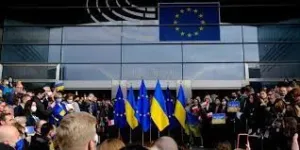Issues
Asia/Pacific

The Asia/Pacific region is home to the majority of the world’s population, containing a diverse range of religions, ethnicities, political systems, and geographies. The region has a long and turbulent history of war, conflict, and oppression, but has undergone a peaceful shift in recent decades. This can be largely attributed to growing prosperity and the rise of international institutions like the United Nations (UN) and the Association of Southeast Asian Nations (ASEAN), promoting peaceful cooperation. Nonetheless, historical traumas of conflict still run deep, and international and domestic conflicts continue to plague the region.
The history of Asia, as of much of the world, is the history of empires rising, falling, and clashing with others. The Mongols, Qing, Mughals, and Joseon Empires, among others, saw great glory but waged vast and destructive wars, altering the course of history. Around the 17th Century, Western imperial powers such as the Dutch, Portuguese, and British began arriving on Asian shores seeking to reap the benefits of trade. These confrontations often escalated into conflict, most notoriously the Opium Wars between Great Britain and the Qing Dynasty in the mid-19th Century. Ongoing crises in Asia, such as those seen in Hong Kong, Papua and in India, are a result of these colonial legacies, of which have consequently shaped the region.
Since 1945, almost every country in the region has been touched by war. During World War II, Japan was at odds with almost every other regional country, having been widely accused of committing atrocious war crimes against civilians. During the Cold War, the Americans and Soviets hashed out their ideological differences across Asia through proxy warfare, in which millions of civilians were affected. The Korean War, which was fought between North Korea (supported by the USSR and China) and South Korea (supported by the UN and the US) left five million dead. The Vietnam War also saw an ideological divide with similar external support, and the conflict spilled over into Laos and Cambodia. As a result, Laos is today the most heavily bombed nation in history. This history of conflict has also shaped the deeply rooted religious and ethnic conflicts that are evident in countries such as the Philippines and Sri Lanka.
Despite the recent arrival of peace at the footholds of the Asia/Pacific region, there remain a handful of active international and domestic conflicts, although globalization and the rise of non-armed state groups is obscuring the line between the two. Currently, hundreds of thousands of Rohingya refugees are being forcibly evicted from Myanmar as part of state led ethnic cleansing, North Korea frequently threatens the use of nuclear weapons on its enemies, and militarization is slowly encroaching upon the South China Sea.
As China and other Asian nations continue to prosper, the region’s persisting conflicts will likely become more complex, resulting in multi-faceted problems for the international community to grapple with. For example, China’s $1 trillion Belt and Road initiative to dominate global trade through investing in less developed economies across Asia, Africa, and the Middle East, will result in lower susceptibility to Western criticism on human rights. In this case, it is probable that the conflicts in Xinjiang, Tibet, Hong Kong, Taiwan, and the South China Sea will continue to deteriorate. Historically on the receiving end of conflict and European imperial ambitions, the Asia/Pacific region has cemented a pivotal role in the international political arena. As regional integration and economic ambitions continue to increase, tackling crises in the Asia/Pacific region will become a global imperative to maintain international peace and security.
Europe
 Putin’s war against Ukraine has already caused thousands of death but also major economic damages globally. We need to handle the impact of this third asymmetric shock in 15 years, at home and abroad. EU leaders agreed at the informal summit in Versailles to bolster European economic resilience, radically reduce our energy imports from Russia and move ahead with a serious strengthening of European Defense. Russia sets conditions for peace talks with Ukraine.
Putin’s war against Ukraine has already caused thousands of death but also major economic damages globally. We need to handle the impact of this third asymmetric shock in 15 years, at home and abroad. EU leaders agreed at the informal summit in Versailles to bolster European economic resilience, radically reduce our energy imports from Russia and move ahead with a serious strengthening of European Defense. Russia sets conditions for peace talks with Ukraine.
The war against Ukraine that Vladimir Putin started is already having considerable economic consequences in Russia, where the rouble has lost half its value and inflation is soaring. Moscow’s stock exchange is closed. Many international companies, like Ikea, McDonald’s, Visa and MasterCard have left the country. Russia’s economy is expected to shrink by at least 15% this year. Weakened and isolated, Russia risks becoming very dependent on China in the future.
However, we are also seeing significant effects in Europe, with energy and other prices rising and probably set to continue to do so. We, inside the EU, have to accept to pay also a price to stop this outrageous and unprovoked war: the future of our security and our democracies depends on it. The price to pay is the price of freedom.
The war in Ukraine is the third asymmetric shock, as economists call it, that the Union has experienced in the last two decades, after the 2008 financial and economic crisis and the following Eurozone crisis and the COVID-19 pandemic. An asymmetric shock is a sudden change in economic conditions that affects some EU countries more than others. The war in Ukraine is indeed having a much greater impact on neighbouring countries due to the influx of refugees and their heavy dependence on Russian gas.
To prevent asymmetric shocks from weakening the EU, we need to step up our capacity to show solidarity with the most affected countries. This is what we did after the 2008-2009 crisis, even if we were slow to do so. This is what we did facing the economic impact of the COVID-19 pandemic, both by pooling vaccine purchases and through the Next Generation EU plan. This is also what we need to do now.

UPCOMING EVENTS
Interpeace works in over 15 countries around the world. Learn about our upcoming events and register to attend.

PEACE TALKS
The Peace Talks is an initiative that showcases the inspirational stories of people making a positive contribution to peace.

SOCIAL MEDIA
Get involved on our social media pages and get the latest news about our peacebuilding programmes.

NEWS LETTER
Keep up-to-date with the latest news and stories from Interpeace. Our newsletter includes poignant insights and latest news from our peacebuilding work.
